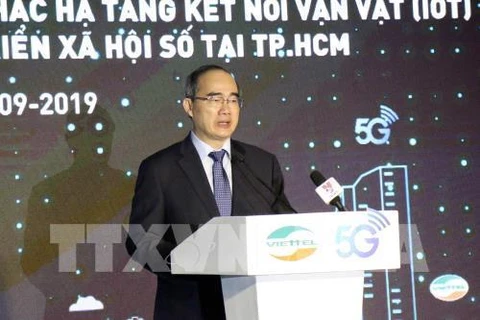Hanoi (VNS/VNA) - As part of plans to catch up with developed economies, Vietnam is looking to embrace the Fourth Industrial Revolution (FIR), with 5G coverage one of the key steps.
Party General Secretary and President Nguyen Phu Trong last year signed Resolution 52-NQ/TW on behalf of the Politburo outlining guidelines and policies to actively participate in the FIR, which set a target of affordable nationwide 5G network coverage by 2030.
To realise this ambitious vision, the Government is planning to test fifth-generation mobile networks in major urban centres such as Hanoi and HCM City.
The Government has issued the first licence to test 5G for Viettel, the country's largest mobile operator, with more than 60 million subscribers in a country with a population of nearly 100 million.
The company tested 5G in Hanoi and HCM City in May last year, and tests are expected to be completed this month.
In April 2019, Viettel said it had successfully tested a 5G broadcasting station in Hanoi at a speed of 600 to 700 Mbps, on a par with Verizon's network in the US.
Other mobile carriers including MobiFone and Vinaphone are also expected to launch their own 5G networks next year.
MobiFone has received a licence to become the second operator to conduct 5G network testing.
Notably, Viettel claimed that it had developed its own core technologies for 5G networks, including chips and devices. In fact, the group said it was aiming to produce 80 percent of the core network infrastructure needed for the network this year. The rest would come from outside suppliers.
MobiFone has chosen to go with Samsung technology, while Vinaphone is cooperating with Nokia.
In the process of Vietnam deploying 5G, many leading technology corporations in the world have expressed their interest in working closely with the Government, carriers, and private enterprises to help the country properly implement its 5G coverage plan and commercialise the technology this year.
5G technology would bring a new economy, helping the country create a series of new products for smart cities, said the Vietnam Telecommunications Authority (VNTA) under the Ministry of Information and Communications.
In the first phase of 5G technology, many Vietnamese enterprises will focus their resources on producing 5G chipset processors. These are considered the "heart" of 5G technology.
Although there have been proactive steps in deploying a 5G network, analysts said the road ahead for Vietnamese carriers is full of challenges and opportunities.
The number of 5G subscribers in Vietnam is expected to reach 6.3 million by 2025, according to a 5G development report published by Cisco in October.
By deploying 5G services, Vietnamese telecom companies could raise their revenue by up to 300 million USD each year from 2025, it noted.
However, Vietnamese mobile service providers would have to invest 1.5-2.5 billion USD in infrastructure development from 2020-25 to launch and operate 5G services, the report said.
Cisco suggested Vietnam and Southeast Asian countries need to address the release of a slow frequency spectrum for 5G services while carriers need to introduce 5G services with appropriate prices to encourage users to move to higher speeds.
Le Dang Dung, chairman and acting general director of Viettel, said when 5G technology started to boom, Viettel will need its own 5G equipment. Therefore, the group must find a way to successfully develop 5G technology, he said.
More importantly, all 5G hardware and software products will be researched and produced by Viettel in Vietnam to ensure information security, Dung said.
Determining the production of 5G chipsets is extremely difficult and expensive, Deputy Minister of Information and Communications Phan Tam said, adding that the ministry wants to form a community of businesses and experts to share experiences of 5G chipset production in Vietnam in the near future./.
VNA
























